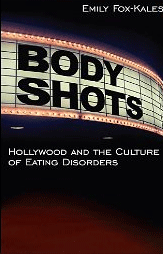“Body Shots: Hollywood and the Culture of Eating Disorders”

“Body Shots: Hollywood and the Culture of Eating Disorders”
By Emily Fox-Kales
State University of New York Press
Albany, N.Y., 2011
Media representations deliver subliminal messages
Reviewed by Paul Efthim, Ph.D.
In my clinical work with college students, the film I hear about most frequently is “Mean Girls,” the 2004 classic starring Lindsay Lohan. A number of my young female patients have watched it literally dozens of times and have committed large portions of dialogue to memory. They refer to the film as a hauntingly realistic portrayal of their own suffering at the hands of popular girls who cruelly employ ridicule and exclusion to enforce social hierarchies.
On its surface, “Mean Girls” admirably satirizes teen social norms which equate female popularity with materialism, slenderness and other external status markers of being “cool.” The villain Queen Bee and her Wannabees rule the school at first but ultimately get their comeuppance before the credits roll. The heroine (Lohan) triumphs by getting the Queen’s boyfriend. Justice prevails, peace is restored, evil is punished.
However, Boston-area clinical psychologist Emily Fox-Kales urges us to look more closely at how “Mean Girls” and other popular movies affect our young women. In her recent book, “Body Shots: Hollywood and the Culture of Eating Disorders,” the author draws on cinema studies to reveal how “Mean Girls” and other media representations of women deliver a more potent subliminal message: even gorgeous girls aren’t quite perfect enough. Constant vigilance and “watching” one’s weight is obligatory. All (female) bodies need work, all of the time.
In addition to her clinical practice, Fox-Kales teaches psychology, film and gender studies at Northeastern University and holds clinical appointments at McLean Hospital and Harvard Medical School. She also has published widely on the treatment of eating disorders and is the founder of Feeding Ourselves, a unique outpatient program for eating disorders based in Arlington, Mass.. From this perspective she points out conflicting messages that young women absorb: although “Mean Girls” and other films of its genre may appear to challenge the “looksism” of adolescent and adult culture, they simultaneously perpetuate these dynamics through the sheer visual power of the images being presented on screen.
The book’s title refers to how the viewer’s gaze is directed by carefully “shooting” the woman’s body using camera angles, lighting, costuming and casting choices that convey powerful nonverbal signals about how women should look. Although Hollywood may purport to tell us that it’s what’s inside that counts (“Shallow Hal,” the “Shrek” series), its films visualize and reinforce another narrative: women should aspire to be thin, toned and sexy. Fox-Kales dissects scenes from several dozen films to illustrate how cinematic portrayals of young women normalize body hatred and valorize restrictive attitudes toward female appetites.
“Body Shots” tackles a variety of themes over its seven well-written chapters, including emotional identification with celebrities and their bodies, the ideology of fitness, teen films, makeover beauty culture, filmic treatment of large-sized women and a look at how some independent films are providing alternative body narratives for women. The author deftly weaves together psychological research, the voices of her students and patients, literary and film criticism, psychoanalysis, and political and economic perspectives into a coherent, sophisticated, compelling account.
One of the most troubling findings in these pages is the sense that American popular culture is becoming even more focused on the “project” of the body, as seen in 1: an increasing phobia of fat (the “war” on obesity, reality shows like “The Biggest Loser” – note the double-entendre), 2: the steady creep of celebrity culture – with all of its focus on appearance and slenderness – into everyday teen life as seen in youths becoming their own media stars on Facebook, Instagram, and other image-based social platforms and 3: the rapid surge in screens and cameras all around us, which commodify our appearance and place special strain on vulnerable persons, particularly adolescents who are navigating the delicate processes of identity formation and separation from family.
As the back cover aptly puts it, “this book aims to provide the moviegoer with the critical tools necessary to develop a resistant gaze at Hollywood productions and make healthier choices among the many viewing screens of our super-mediated world.” Written both for a general audience as well as for students of cultural and gender studies, “Body Shots” excels in linking sociocultural processes with the emotional experiences of women in relation to their embodied selves. It is highly recommended for readers and teachers interested in media literacy and cultural aspects of eating disorders.
Paul Efthim, Ph.D. is a licensed psychologist in private practice in Brookline, Mass. He holds a faculty appointment at the Boston Institute for Psychotherapy and is a candidate at the Massachusetts Institute for Psychoanalysis.
Learn more about the book: Body Shots: Hollywood and the Culture of Eating Disorders (Excelsior Editions)
